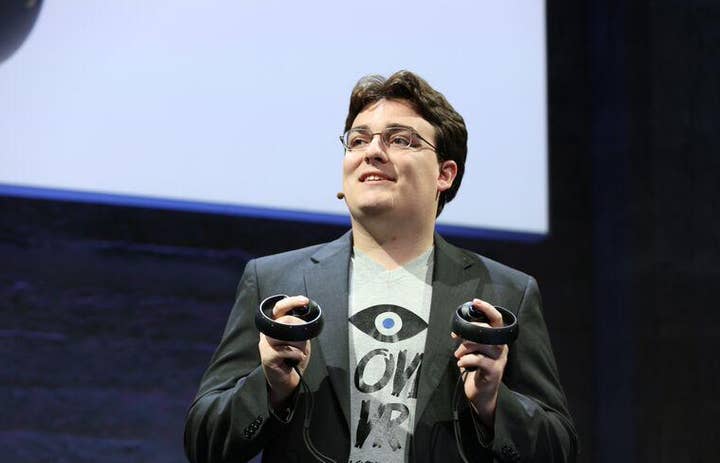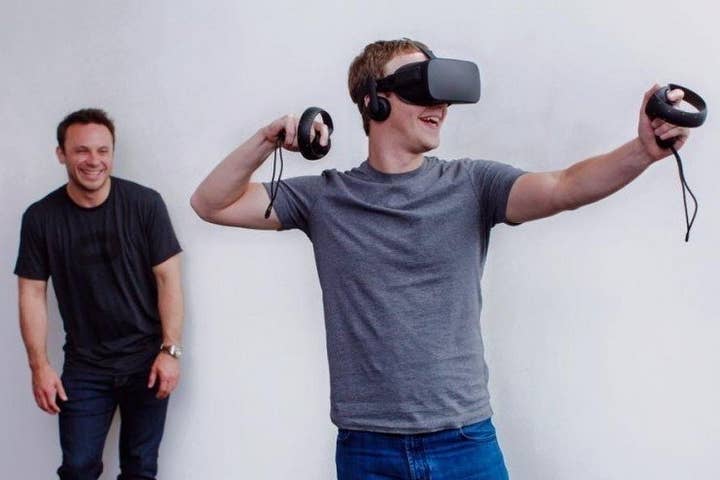Collaboration vs. Competition: The battle for VR dominance begins
Oculus' Touch controller is a challenge to the role of standards in the emerging market virtual reality
My personal response to the latest tilt at virtual reality gaming has been inconsistent, and that's putting it mildly. I played one of the earliest Oculus Rift prototypes, an unsightly device that seemed like nothing more than a novel way to experience Doom 3. John Carmack was excited by its promise, so I attributed my own muted response to ignorance about the hard problems that Palmer Luckey had apparently solved. Subsequent iterations of the hardware chipped away at my doubts, and a memorable first encounter with CCP's EVE Valkyrie took a sledgehammer to their very foundations.
Sony, Valve and Facebook's bank account added the kind of financial clout I assumed would be necessary for the whole endeavour to be viable. Then the recommended PC specs for Oculus Rift and Vive proved just how much financial clout the consumer would need to access the form at its very best. Even now, with the Rift, Vive and PlayStation VR all scheduled to launch within the next two quarters, so many vital details remain obscure. What type and variety of experiences will be available at launch? How much will they cost? How will they be sold? With just a few months to go, nobody has even committed to a price for the hardware.
"We feel it's very important in these early days that developers develop for multiple platforms. We feel that helps mitigate some of their risk"
Yasser Malaika, Valve
Amid all this ambiguity, the apparent bonhomie among the leading companies has been reassuring. Console launches can become mired in tit-for-tat rhetoric, but the rise of VR has been defined by the sharing of knowledge and ideas, and a general sense that unity will be essential if a sustainable consumer market is to be created. Paul Hollywood, the creative director at Starship, said as much when we talked at Unite Europe in June. Describing his experiences talking to the big dogs of VR at E3 this year, he noted, "they're all working together. They realise that there needs to be a self-sustainable ecosystem to be able to make money in the future. They're only going to achieve that if they work together now, and be a collective."
This notion was voiced a month later, by Valve's Yasser Malaika in his talk at GDC Europe. He spoke engagingly about the value of setting technological standards, even at this early stage. Not only to further encourage a progressive development culture based on sharing and collaboration, but to give companies the best possible chance at building a business in a market that is still months away from even existing. "We feel it's very important in these early days that developers develop for multiple platforms," Malaika told the crowd in GDC Europe's packed main room. "We feel that helps mitigate some of their risk, and we hope that will allow the market for VR develop in a healthier way."
As admirable as that sentiment is, though, it isn't how business works. Creating a market for VR that both appeals to consumers and nourishes developers is a massive task - arguably larger than creating the hardware - and one that will require even more co-operation than we've already seen. But the simple fact is that these companies are direct competitors taking enormous financial risks, and we're now at the point where the ideal of community will clash with the growing need to distinguish their products.

That much was made clear in a meeting with Oculus VR at Gamescom, just a few days after Malaika's talk. The "hand presence" that the company's Touch controllers give the user, CEO Brendan Iribe said, is the latest "magical moment" in a lineage that included both that Doom 3 demo and the higher fidelity Crescent Bay prototype. More importantly, though, Iribe positioned Touch not as a breakthrough for the medium in general, but for Oculus specifically. Sony has been using Move controllers in conjunction with PlayStation VR, and the Vive's hand input prototypes have a similar "wand" shape. Oculus both expected and invited this difference. It is the point at which hardware standards end and competitive advantage begins.
"We had the suspicion - and it turned out to be right - that VR input was gonna be different," Iribe said. "We prototyped VR input for years, and we figured out which path we wanted to go to quite a while ago. We were really confident that hand presence - seeing your hands, the things that you stare at most all day long - was going to be the right way, and that we may be the only people that went that way. It's a differentiator for us that I think's gonna add a lot of value, and attract people to target the Rift with unique experiences and to buy the Rift to have those experiences.
"We don't believe in wand-based input for the future of VR. We really believe in hand presence, in hand input, so we let everybody else go"
Brendan Iribe, Oculus
"Frankly, we wanted to wait and let other people show off their input, and hitch to wand-based input. We don't believe in wand-based input for the future of VR. We really believe in hand presence, in hand input, so we let everybody else go."
For what it's worth, my first demo with Touch happened just a few minutes before my conversation with Iribe, and it had a greater impact on me than any of my previous VR experiences. The ability to see your hands, to grab objects, to point your index fingers and raise your thumbs toward another person, all in a virtual environment, is extremely impressive. Touch is, for me, the first time that the hyperbole around VR and the actual experience have truly aligned.
Iribe made it very clear that experiences specifically designed for Touch would be in limited supply when the Oculus Rift launches. The company's decision to let its competitors draw first means that the owners of the 180,000 dev kits currently out there are only now getting access to the technology, and it will take, "six, twelve, twenty-four months to make the first set of content." But when it does arrive it will be what sets Oculus apart from and, if Iribe is correct, above its competitors.
"If you look at VR, I think it's pretty early to say that these things are all going to end up being similar enough that you can target them all at the same time," he said. "I think they're gonna be similar enough that, if you want to target them based on a gamepad, that you can do that.
"I don't think you can build a standard around that at this stage, when we've gone one direction - showing you your hands - and other people have gone another direction based on wands. What I do think you'll see is most of VR pivoting towards hands.
"Some people will maybe build for Touch first and then take it to other platforms, but I think it will be a lot less compelling."









